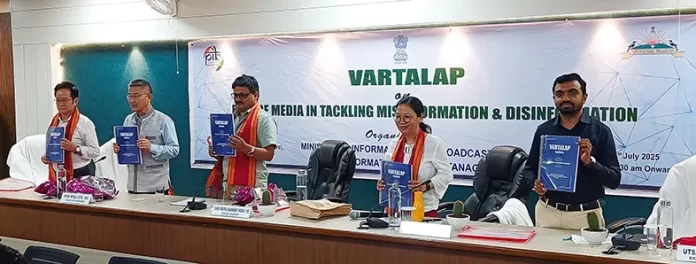[ Harshwardhan Pillai ]
ITANAGAR, 14 Jul: A workshop titled ‘Vartalap: Role of media in tackling misinformation and disinformation’ was held at the DK Convention Hall here on Monday.
The workshop was organised by the Press Information Bureau (PIB), Itanagar, in collaboration with the union Ministry of Information and Broadcasting.
The session saw participation of journalists, government officials, mass communication students, and members of the public. The aim was to talk about how misinformation and disinformation are affecting society, and what role media and citizens can play in stopping the spread of fake or misleading content – especially online.
Central Bureau of Communication Deputy Director Utsav Parmar Utsav Parmar, said that today’s media environment is mixed – with truth, lies, and half-truths often bundled together. “It is now more important than ever for journalists to double-check facts before reporting, and for the public to think before forwarding any message,” he said.
He also mentioned how WhatsApp and other apps are becoming hotspots for spreading fake news and offensive content without any checks.
Additional Director General of PIB (NER) Kripa Shankar Yadav shared his personal experience of working in the Northeast. He talked about how fast media has grown in Arunachal Pradesh, but said that the speed of information-sharing must be matched with responsibility. He pointed to Article 19 (1) (a) of the Indian Constitution, which protects freedom of expression, but reminded everyone that it comes with limits. He also informed the participants about central schemes available for journalists – especially during emergencies – and said that staying connected with other media professionals is important in this growing digital media space.
One of the key voices at the workshop was Deputy Editor of The Arunachal Times, Tongam Rina, who served as a resource person. She addressed the increasing misuse of digital tools like AI and social media algorithms to push fake or harmful content. She pointed out how some people are repeatedly sharing such content online and still face no action from the platforms. She said also that in places with low digital literacy, people often fall for edited images, fake quotes, or false headlines, which can lead to real-life consequences.
Representing the Arunachal Pradesh government, Information and Public Relation (IPR) Secretary Nyali Ete described the media as the “first line of defence” in the digital world. He said that with the rise of AI, edited visuals, and fast-forwarded content, people’s opinions can be manipulated within seconds, and that it is no longer enough to just rely on the media – “the public also needs to stay aware and be able to question what they see or hear online.”
IPR Director Gijum Tali shared an example from his own career and how he once faced backlash due to misinformation that was wrongly linked to his reporting. He encouraged young journalists to always be mindful and double check the information they write or publish.
The workshop ended with an open Q&A session, where journalists and students dwelt on several questions about digital verification tools, social media policy, and how to improve media literacy among the general public.
There were also discussions on how to encourage fact-checking at the local level.
PIB officials clarified that although Arunachal Pradesh currently does not have a full-fledged PIB fact-check unit, the service is available through its Guwahati office. Plans are underway to set up a dedicated team in the state in the near future to help fight fake news more effectively, they said.

